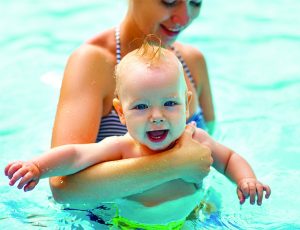 For most children, there is nothing more fun than playing in water of some sort—pools, lakes, rivers, or the beach. But with that fun comes a very high risk of drowning, and there is nothing more tragic than the drowning of a precious child. Follow these tips closely to keep your little ones safe this summer.
For most children, there is nothing more fun than playing in water of some sort—pools, lakes, rivers, or the beach. But with that fun comes a very high risk of drowning, and there is nothing more tragic than the drowning of a precious child. Follow these tips closely to keep your little ones safe this summer.
There Is No Substitute for Active Supervision
1. Actively supervise children in and around open bodies of water, giving them your undivided attention.
2. Whenever infants or toddlers are in or around water, an adult should be within arm’s reach to provide active supervision. We know it’s hard to get everything done without a little multitasking, but this is the time to avoid distractions of any kind. If children are near water, then they should be the only thing on your mind. Small children can drown in as little as one inch of water.
3. When there are several adults present and children are swimming, use the Water Watcher card strategy, which designates an adult as the Water Watcher for a certain amount of time (such as 15-minute periods) to prevent lapses in supervision. Download a Water Watcher card at safekids.org.
Start Slow With Babies
1. You can start introducing your babies to water when they are about 6 months old. Remember to always use waterproof diapers and change them frequently.
Educate Your Kids About Swimming Safely
1. Every child is different, so enroll children in swimming lessons when you feel they are ready. Teach children how to tread water, float and stay by the shore.
2. Make sure kids swim only in areas designated for swimming. Teach children that swimming in open water is not the same as swimming in a pool. They need to be aware of uneven surfaces, river currents, ocean undertow and changing weather.
3. Whether you’re swimming in a backyard pool or in a lake, teach children to swim with an adult. Older, more experienced swimmers should still swim with a partner every time. From the first time your kids swim, teach children to never go near or in water without an adult present.
Don’t Rely on Swimming Aids
1. Remember that swimming aids such as water wings or noodles are fun toys for kids, but they should never be used in place of a U.S. Coast Guard-approved personal flotation device (PFD).
Take the Time to Learn CPR
1. We know you have a million things to do, but learning CPR should be on the top of the list. It will give you tremendous peace of mind – and the more peace of mind you have as a parent, the better.
2. Local hospitals, fire departments and recreation departments offer CPR training.
3. Have your children learn CPR. It’s a skill that will serve them for a lifetime.
Take Extra Steps Around Pools
1. A swimming pool is a ton of fun for you and your kids. Make sure backyard pools have four-sided fencing that’s at least 4 feet high and a self-closing, self-latching gate to prevent a child from wandering into the pool area unsupervised.
2. When using inflatable or portable pools, remember to empty them immediately after use. Store them upside down and out of children’s reach.
3. Install a door alarm, a window alarm or both to alert you if a child wanders into the pool area unsupervised.
Check the Drains in Your Pool and Spa
1. Educate your children about the dangers of drain entanglement and entrapment and teach them to never play or swim near drains or suction outlets.
2. Pools that pose the greatest risk of entrapment are children’s public wading pools, in-ground hot tubs, or any other pools that have flat drain grates or a single main drain system.
3. For new pools or hot tubs, install multiple drains in all pools, spas, whirlpools and hot tubs. This minimizes the suction of any one drain, reducing risk of death or injury. If you do have drains, protective measures include anti-entrapment drain covers and a safety vacuum release system to automatically release suction and shut down the pump should entrapment occur.
4. Regularly check to make sure drain covers are secure and have no cracks, and replace flat drain covers with dome-shaped ones. If a pool or hot tub has a broken, loose or missing drain cover, don’t use it.
5. If you do have drains, protective measures include anti-entrapment drain covers and a safety vacuum release system to automatically release suction and shut down the pump should entrapment occur. Go to www.PoolSafely.gov for a list of manufacturers of certified covers.
6. Check to make sure your pool or hot tub’s drains are compliant with the Pool and Spa Safety Act.
Source: safekids.org
Check Also
Revolutionizing Healthcare: Exploring Regenerative Medical Treatments at QC Kinetix
By Daniel Sucherman, MD In recent years, the field of regenerative medicine has emerged as …
 Central Florida Health and Wellness Magazine Health and Wellness Articles of the Villages
Central Florida Health and Wellness Magazine Health and Wellness Articles of the Villages


